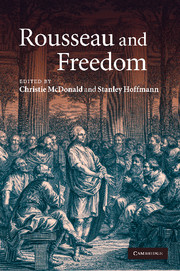Book contents
- Frontmatter
- Contents
- List of illustrations
- Notes on contributors
- Acknowledgments
- List of abbreviations
- Introduction
- PART I
- PART II
- PART III
- 14 Paranoia and freedom in Rousseau's final decade
- 15 Freedom and the project of idleness
- 16 On the uses of negative freedom
- 17 Fail better: Rousseau's creative délire
- Postface: Rousseau and freedom
- Bibliography
- Index
15 - Freedom and the project of idleness
Published online by Cambridge University Press: 05 May 2010
- Frontmatter
- Contents
- List of illustrations
- Notes on contributors
- Acknowledgments
- List of abbreviations
- Introduction
- PART I
- PART II
- PART III
- 14 Paranoia and freedom in Rousseau's final decade
- 15 Freedom and the project of idleness
- 16 On the uses of negative freedom
- 17 Fail better: Rousseau's creative délire
- Postface: Rousseau and freedom
- Bibliography
- Index
Summary
Rousseau's autobiographical works base a series of practices of freedom on an unexpected foundation: that of idleness. My examples will be drawn mainly from two representative works: Rousseau, Judge of Jean-Jacques: Dialogues and the Reveries of the Solitary Walker. In contrast to Rousseau's political writings, where freedom is defined in relation to work, as a condition of the citizen's political emancipation, Rousseau's autobiographical period performs a virtual about-face when he develops his grand project of idleness. This reorientation is neatly summed up in a statement from his Considerations on the Government of Poland: “Repose and freedom appear incompatible to me; it is necessary to choose.” But, as we shall see, “doing nothing” becomes the formula for the solitary experience of freedom. Rousseau seeks to remove himself from various forms of constraint or subjugation. He chooses disengagement and disinterest. It is as if the thinker of the Social Contract later came to invent a logic of subjective freedom that is unfettered by any bond or attachment, a new sovereignty of liberty.
Laziness is the organizing principle of Rousseau's entire moral persona. He seeks to withdraw from the universe of action. This is what impels him to give in to a series of pursuits that could be described as invisible: for example, that of music, which Rousseau tells us is suited to his “lazy mind.” He adjusts easily to his middling financial condition – neither luxury nor deprivation – and his intellectual work is measured by the same yardstick of moderation.
- Type
- Chapter
- Information
- Rousseau and Freedom , pp. 245 - 256Publisher: Cambridge University PressPrint publication year: 2010

